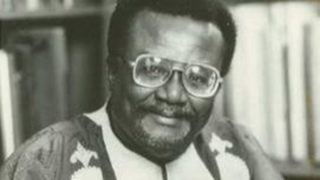
Twenty years after the demise of a literary icon, Prof. Ola Rotimi, scholars and theatre practitioners in Nigeria and abroad recently honoured the playwright at a webinar organised by the Bowen University, Iwo, Osun State.
The theatre teacher, scholar and playwright died on August 18, 2000.
The event had as theme: ‘Remembering Ola Rotimi, A Complete Man of the Theatre, 20 Years On’.
Speakers at the webinar, which was a conclave of scholars, included Prof. Akanji Nasiru, Prof. Olu Obafemi, Oba Segun Akinbola and others. Dr. Bisi Adigun moderated it.
The webinar elicited fond memories of the scholar, who founded Ori Olokun Theatre Company, Obafemi Awolowo University and later the Department of Creative Arts, University of Port Harcourt.
In his goodwill message, Oba Akinbola recalled the career trajectory of Ola Rotimi while Prof. Nasiru delved into his works.
In his lecture, titled: ‘Contextualising Ola Rotimi’s Theatre’, he examined the dramaturgy of Rotimi and his entry into the already active theatre scene 10 years after Wole Soyinka and John P. Clark.
“He knew that language was a serious aspect of Nigerian and African Literature so he considered the African audience in his writings. The intelligentsia was the target of early drama in Nigeria. Language affected the popularity of drama in Nigeria. Rotimi took language seriously, and so, he developed the kind of English language that could appeal to even the ordinary man. He deliberately toned down the language to admit the local audience and that affected other techniques of his dramatics,’’ he said.
Prof. Obafemi spoke on how he encountered Ola Rotimi in 1975 as a young National Youth Service Corps (NYSC) teacher who produced one of his plays in Nnewi.
In his submission titled: ‘History, Theatre, Language and Participation in the Political Process: The Theatre of Ola Rotimi’, he identified how his plays have established him as a politically engaged dramatist with works like The Gods are Not to Blame, Our Husband Has Gone Mad Again, If… The Tragedy of The Ruled and Hopes of the Living Dead.
A day before the webinar there was a media briefing heralding the webinar where various scholars and intellectuals were unanimous that the late icon needed to be honoured.
Dr. Grace Olutayo, who is the Provost of College of Liberal Studies, had disclosed that: “The celebrated Nigerian playwright and director, Olawale Emmanuel Gladstone Rotimi, famously known as Ola Rotimi, who passed on, in August 18, 2000. Born on April 13, 1938, Ola Rotimi was unarguably one of the most prolific Nigerian playwrights Bowen University is glad to be associated with this iconic man of Theatre.”
Provost, Post-Graduate College of the university, Nasiru, said the contribution of Rotimi to humanity was enormous, hence, he should be honoured.
Also speaking, Adigun, a senior lecturer, Theatre and Performing Arts, Bowen University, said it was a disgrace that no road had been named after the late dramatist.
“There was a time I wrote an article I called Nigeria, a Nation that is cursed with many blessings. I lived in Ireland for almost 20 years. Ireland is about five million. If a writer like that is Irish, sincerely speaking, they would have named in fact, his estate should have been in the money. Ola Rotimi, the man of his calibre, nobody has remembered him for 20 years? It is a disgrace. Why it is a disgrace is because God has blessed us with so many good things. With too many talents. God has blessed with human resources. So, it is a disgrace that 20 years after his death, we are just remembering Ola Rotimi. And it is my hope that we learn how to remember him therein on. Hopefully we give him the kind of honour that he duly deserves. There is no reason why National Theatre we are renovating should not be named after him,’’ he lamented.
Similarly, Dr. Stanley Ohenhen, Programme Coordinator, Theatre Arts, Bowen University, urged Nigerian leaders to emulate Rotimi’s virtues of hard work, excellence, and dedication.
He said: “If anything is missing in today‘s Nigeria, it is excellence. These are the things Ola Rotimi stood for. Here we identify with his dedication, excellence, accountability, hard work, and Godliness.”
Prof. Rotimi, aside from being a complete man of the theatre, lectured at the then University of Ife from 1969 until he took up an appointment with the University of Port Harcourt in 1977.
A dramatist, his most staged plays made him the darling of total theatre lovers home and abroad, include, The Gods Are Not to Blame (1968), Kurunmi (1969), and Ovonramwen Nogbaisi (1971). His first plays, To Stir the God of Iron (produced in 1963) and Our Husband Has Gone Mad Again (produced 1966; published 1977) were staged at the Drama schools of Boston University and Yale, respectively.
END

Be the first to comment